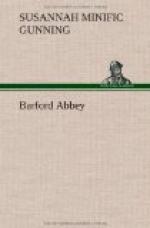What an exalted woman is Lady Powis!
My children, said she; taking a hand from each,—I am thankful: whom the Lord loveth he chasteneth.—Let us follow his great example of patience,—of resignation.—What is a poor span?—Ours will be eternity.
I whisper’d Mr. Morgan, a female friend would be necessary to attend the Ladies;—one whom they lov’d,—whom they confided in, to be constantly with them in their apartments.—He knew just such a woman, he said; and went himself to fetch Mrs. Jenkings.—Lady Powis being unable longer to support herself, propos’d withdrawing.—I offered my arm, which she accepted, and led her to the dressing-room.—Mrs. Powis follow’d; almost lifeless, leaning on her husband: there I left them together, and walk’d out for a quarter of an hour to recover my confus’d senses.
At my return to the library, I found Sir James and Mr. Watson in conversation.—The former, with a countenance of horror and distraction,—Oh Sir! said he, as I came near him,—do I see you again?—are you kind enough not to run from our distress?
Run from it, Sir James! I reply’d;—no, I will stay and be a partaker.
Oh Sir! he continued, you know not my distress:—death only can relieve me—I am without hope, without comfort.
And is this, Sir James, what you are arriv’d at? said the good chaplain—Is this what you have been travelling sixty years after?—Wish for death yet say you have neither hope or comfort.—Your good Lady, Sir, is full of both;—she rejoices in affliction:—she has long look’d above this world.
So might I, he reply’d,—had I no more to charge myself with than she has.—You know, Mr. Watson,—you know how faulty I have been.
Your errors, dear Sir James, said he, are not remember’d.—Look back on the reception you gave your son and daughter.
He made no reply; but shedding a flood of tears, went to his afflicted family.
Mr. Watson, it seems, whilst I had been out, acquainted him with the contents of your letter;—judging it the most seasonable time, as their grief could not then admit of increase.
Sir James was scarce withdrawn, when Lady Powis sent her woman to request the sight of it.—As I rose to give it into her hand, I saw Mr. Morgan pass by the door, conducting an elderly woman, whom I knew afterward to be Mrs. Jenkings.—She had a handkerchief to her eyes, one hand lifted up;—and I heard her say, Good God! Sir, what shall I do?—how can I see the dear Ladies?—Oh Miss Powis!—the amiable Miss Powis!
Mr. Morgan join’d us immediately, with whom and Mr. Watson I spent the remainder of this melancholy evening: at twelve we retir’d.
So here I sit, like one just return’d from the funeral of his best friend;—alone, brooding over every misery I can call together.—The light of the moon, which shines with uncommon splendor, casts not one ray on my dark reflections:—nor do the objects which present themselves from the windows offer one pleasing idea;—rather an aggravation to my heart-felt anguish.—Miserable family!—miserable those who are interested in its sad disaster!—




